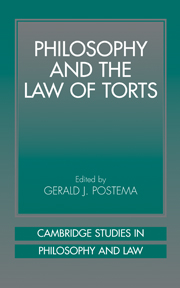Book contents
- Frontmatter
- Contents
- Contributors
- 1 Introduction: Search for an Explanatory Theory of Torts
- 2 A Social Contract Conception of the Tort Law of Accidents
- 3 Responsibility for Outcomes, Risk, and the Law of Torts
- 4 The Significance of Doing and Suffering
- 5 Tort Law and Tort Theory: Preliminary Reflections on Method
- 6 Corrective Justice in an Age of Mass Torts
- 7 Economics, Moral Philosophy, and the Positive Analysis of Tort Law
- 8 Pluralism in Tort and Accident Law: Towards a Reasonable Accommodation
- References
- Index
3 - Responsibility for Outcomes, Risk, and the Law of Torts
Published online by Cambridge University Press: 01 July 2009
- Frontmatter
- Contents
- Contributors
- 1 Introduction: Search for an Explanatory Theory of Torts
- 2 A Social Contract Conception of the Tort Law of Accidents
- 3 Responsibility for Outcomes, Risk, and the Law of Torts
- 4 The Significance of Doing and Suffering
- 5 Tort Law and Tort Theory: Preliminary Reflections on Method
- 6 Corrective Justice in an Age of Mass Torts
- 7 Economics, Moral Philosophy, and the Positive Analysis of Tort Law
- 8 Pluralism in Tort and Accident Law: Towards a Reasonable Accommodation
- References
- Index
Summary
Introduction
Can there be a non-consequentialist moral theory of negligence law, or, more generally, can there be a non-consequentialist moral theory capable of justifying the imposition of tortious liability for unintentional harm? Most corrective justice theorists say yes, but the basis of that answer is hardly obvious on its face. After all, the predominant scholarly view is that the negligence standard of reasonable care is to be understood in utilitarian or economic terms, and this view is shared even by some who call themselves deontologists (Hurd 1996). Furthermore, the actions that bring about unintentional harm are not typically culpable or blameworthy, and sometimes they are not in any sense wrongful either. But the notions of culpability, blameworthiness, and wrongfulness lie at the heart of non-consequentialist theories of the criminal law, and it would not be implausible to think that they are central to non-consequentialist thought generally. It is true that negligence is characterized by the law as a species of “fault,” but this clearly does not refer to fault in the core sense of wrongful action motivated or accompanied by a culpable state of mind. Moreover there are a number of circumstances in which tort law imposes strict liability for unintentional harm, and in these cases the law does not even purport to claim that the action giving rise to the harm is to be regarded as faulty. Is it possible to account in non-consequentialist terms for the full range of tortious liability for unintentional injury?
- Type
- Chapter
- Information
- Philosophy and the Law of Torts , pp. 72 - 130Publisher: Cambridge University PressPrint publication year: 2001
- 33
- Cited by

